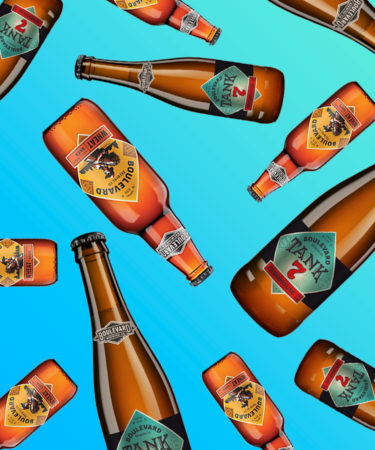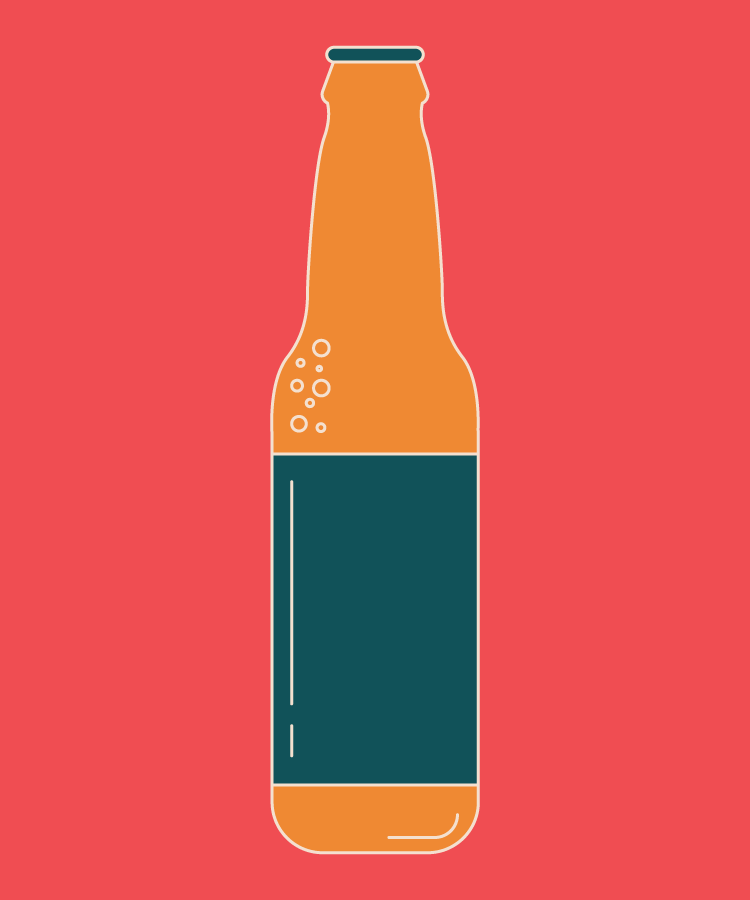It all began in the summer of 1984 with a European vacation. John McDonald found himself in Paris at a bar that specialized in Belgian beer. The pints he sipped that day inspired him to make beer himself — but it would be five more years until he opened Boulevard Brewing Co. in Kansas City, Mo. After attending art school, and taking up cabinet making, McDonald proved himself to be a true beer pioneer when he finally opened Boulevard in 1989.
In 2013, Boulevard joined Brewery Ommegang as part of the Duvel Moortgat family (which also includes Firestone Walker Brewing Company and breweries across Europe, such as Belgium’s Brasserie d’Achouffe and Birrificio del Ducato in Italy). McDonald sits on the company’s board, and we imagine he has the opportunity to fly off to Europe, or that bar in Paris, at more regular intervals than he did on that trip so long ago.
When asked why he started the brewery, McDonald says that he was really interested in making things. He’s made something pretty impressive with Boulevard. Here are 14 things you need to know about Boulevard Brewing.
Boring beer paled in comparison to Boulevard’s first ale.
In Boulevard’s early days, McDonald brewed beers he’d been dreaming about for half a decade. Those beers, like Boulevard Pale Ale, a combination of caramel malts and zesty hops, and Unfiltered Wheat Beer, a citrusy American-style wheat beer, would eventually win national attention and awards.
The first keg of Boulevard Pale Ale was sold on Nov. 17, 1989. McDonald threw it in the back of his pickup truck and delivered it in person to the brewery’s first customer: a Mexican restaurant two minutes down the road. (A year later, McDonald convinced an investor to give him the capital he needed to buy a very small, very used bottling line, allowing the Boulevard team to start bottling.)
Boulevard’s saison was many Americans’ first.
After Belgian brewer Steven Pauwels came on board as Boulevard’s brewmaster, he took a stab at Belgian-style saison, a style not common — or well known — in much of the U.S. at the time. Eventually, Boulevard would help popularize the saison style with Tank 7 when it arrived in 2009 (a decade after Brewery Ommegang took the lead by introducing Hennepin Farmhouse Saison).
Brewed with a combination of Belgian yeasts (though not specifically saison yeasts) and dry-hopped with Amarillo, Tank 7 got set aside in the fermentation tank marked “seven” — which reportedly was the brewers’ least favorite tank of the bunch for an undisclosed reason. During quality control, someone took a sip and it blew them away. The brewers named it Tank 7 and incorporated it into its Smokestack Series, a collection of big, bold beers. The dry but spicy beer with notes of grapefruit from the hops immediately found a thirsty audience.
Tank 7 was ‘discovered,’ and became a movie star.
In January of 2020, Tank 7 stepped onto the silver screen — or, maybe more accurately, the aluminum screen. Boulevard decided to can its saison, printing the label onto 16-ounce aluminum cans and tucking them into 4-packs. The fresh packaging came as part of a partnership with Paramount Pictures to promote the release of “A Quiet Place Part II.”
According to Natalie Gershon, vice president of marketing at Boulevard, the beer paired well with the film because they were both “scary good.” It also complements a big bucket of popcorn pretty well.
It left the brewery a beer and came back a whiskey.
When Boulevard shipped a tanker of its Unfiltered Wheat to Foundry Distilling Company, in West Des Moines, Iowa, it was the beginning of a two-year-long coming-of-age story. Foundry’s Scott Bush distilled the beer, then aged it for two years in 30-gallon charred oak barrels. The resulting spirit, an 89-proof American malt whiskey that featured aromas and flavors of banana bread, allspice, and caramel, arrived at Iowa retailers in August of 2020. Distribution of the whiskey, Midnight Ritual, would later extend to Missouri, Kansas, and Nebraska.
Midnight Ritual was the first in a series of brewer and distiller collaborations that Foundry intends to release. The distillery has teamed up with several other breweries aside from Boulevard. Whiskeys distilled from Stone Brewing Co.’s Arrogant Bastard Ale and Surly Brewing Co.’s Furious IPA, among several others, are slated for release in 2021.
Boulevard’s brewmaster has friends with benefits.
Boulevard’s Unfiltered Wheat wasn’t the first of the brewery’s beers to step into a whiskey barrel. Boulevard brewmaster Steven Pauwels had a working relationship with Bush, having used barrels from the distiller’s previous venture, Templeton Rye, to age Boulevard’s Smokestack Series. The special collection includes bigger, bolder bottle offerings such as a Whiskey Barrel Stout, Bourbon Barrel Quad, and Tank 7.
McDonald brewed, built cabinets, and slept at the brewery.
In order to get the money required to start a new business, McDonald sold his house, moved into an old brick building in town, and operated his cabinetry business in a corner. Meanwhile, he retrofitted the building and installed a 35-barrel vintage Bavarian brewhouse. The building, originally a laundry for the Santa Fe Railway from 1859 to 1995, operated as the Boulevard headquarters until an expansion in 2006. (McDonald eventually moved out.)
Boulevard crossed the road.
By 2004, that original 35-barrel vintage Bavarian brewhouse was working overtime, producing nearly 100,000 barrels of beer per year. Boulevard had grown too big for its original brick building. That’s why in 2005, the brewery broke ground on a new headquarters across the street.
The three-story, 70,000-square-foot construction took advantage of urban land use to minimize its footprint and also featured a sustainable design. In the years following the completion of the new brewery, Boulevard installed solar panels and adopted a zero landfill policy, meaning that the entire company either recycles or composts all of its waste.
Boulevard beer is a stadium staple.
For the last 20 years, seamheads have been able to find Boulevard beers at Kauffman Stadium, where the Kansas City Royals play. In 2020, they took it up a notch by collaborating with two players: Third baseman Hunter Dozier and second baseman Whit Merrifield. Together, the players and Boulevard released Hustle Up!, a 100-calorie blonde ale. T-shirts sold to memorialize the partnership benefit both the Big Brothers Big Sisters of Kansas City and the Ronald McDonald House Charities of Kansas City.
Boulevard kicks glass.
As a way to extend its continued efforts to protect the environment, Boulevard teamed up with neighboring companies and organizations in the community to find a better way to recycle the glass used by Kansas Citians. The solution they came up with was Ripple Glass and it started in 2009.
By supporting the construction of a local glass processing plant and setting giant purple bins around the city, the group found a way to recycle used glass more effectively than sending it to a landfill. In addition, a local manufacturer transforms the glass into fiberglass insulation, and other partners have found ways to reuse the glass as well.
As of 2020, more than 80 surrounding communities, like Jefferson City and Branson, have adopted Ripple Glass to help them keep used glass products out of their landfills.
Boulevard practices sustainability, inside and out.
Not only does Boulevard practice sustainability inside, but it’s also gone green on the roof. Literally. The brewery installed a green roof on the top of the brewhouse and packaging building, which basically just means it planted a wide array of greenery and plants up there. It helps insulate the building, lowering heating and air-conditioning needs and minimizes the amount of energy needed to run the facility.
Boulevard needed more room for activities.
In 2016, another expansion added the Tours & Rec center next door to the brewery. It included a 10,000- square-foot beer hall and acted as a hub for brewery tours. The building included exhibits about Boulevard and its beer. The Rec Deck, an outdoor space, was added to the fourth floor in 2019. The 2016 expansion also gave Boulevard a 3,600-square-foot facility for six more 1,000-barrel fermentation tanks. It increased the brewery’s fermentation capability by 40 percent.
Boulevard fills cans the fancy way.
A $10 million canning line arrived at the brewery in April of 2018. It was Boulevard’s extreme entry into canning. The brewery, which had primarily relied on glass prior to this time, could now fill 350 12-ounce cans in a minute with its new fancy high-speed contraption.
The other interesting thing about this canning line? It fills cans warm. More technically, it uses a warm filling process to allow secondary fermentation after packaging. While Boulevard had been doing this with its bottles for years, it was relatively unheard of for cans.
To sell its own beer, it had to make wine.
Part of the 2006 expansion included a suite above the brewery where Boulevard hosts private events. Because of local laws, the brewery quickly learned it couldn’t sell its own beer in that suite during certain events — but discovered through research that wineries in the state had the ability to get permits that allow selling their own products on-premise. So, after a rigmarole with a lawyer, Boulevard got the permits it needed and started its own wine brand: Boulevard Wine. It would result in McDonald planting a small vineyard on two acres in Truman Lake, Mo. The Boulevard house wines are still served at on-site events.
Eat, drink, and be married at Boulevard.
Speaking of that event suite, couples get married there. The Muehlebach Suite, on the top floor of the brewery, can be reserved for wedding receptions, along with corporate and non-profit events. The package includes Boulevard beer and wine, a gorgeous view of Kansas City, a custom pint glass for each guest, and of course, a good story.

